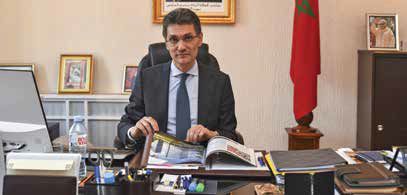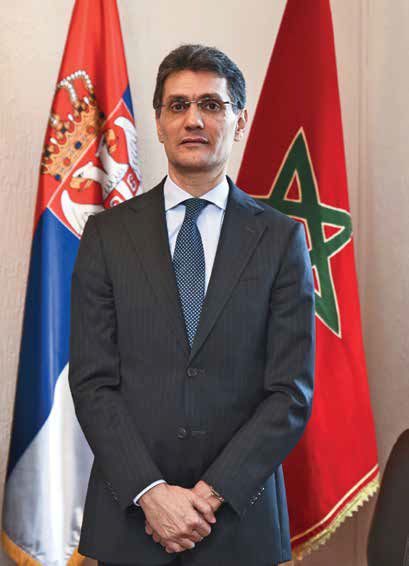Morocco and Serbia maintain harmonious relations in politics and they think about the future progress in economy and tourism, with the hope that the Serbians and Moroccan will know each other better after the establishment of the direct air flight between Belgrade and Casablanca in 2019. We are talking with H.E. Mohammed Amine Belhaj, Moroccan Ambassador to Serbia about this and other interesting topics.

Morocco and Serbia cooperate harmoniously politically speaking, supporting each other internationally, because they face the same challenges when it comes to their territorial integrity. Are you satistied with the political ties between the two countries?
– Morocco and Serbia maintain excellent political relations. Those relations were strengthened by the official visit, last September, of the Minister of Foreign Affairs and International Cooperation of the Kingdom of Morocco to Belgrade to hold political consultations. The excellence of bilateral relations also shows in the mutual support within international organizations and forum where Morocco and Serbia support each other’s national sovereignty and territorial integrity. We also cooperate and exchange views on a number of global issues such as climate change, violent extremism, and illegal migration etc. I am glad to say that Serbia will be represented by the Vice Prime Ministre, Minister of Foreign Affairs, H.E M. Ivica Dacic in the Intergovernmental Conference on the Global Compact for Migration to be held on 10-11 December 2018 in Marrakesh.
Morocco not so long ago showed its desire to be an EU member but it was rejected and offered Mediterranean partnership an advanced status instead. It seems that the same destiny can be faced by Serbia. What do you think, should we cooperate more closely economically, not waiting for the EU to “save us all”?
– I think cooperation with Serbia is going well and a lot of effort is being made to increase cooperation in the economic field. Such cooperation should continue regardless of regional groupings. I think Serbia is doing well in negotiating its membership to the European Union. It is a long process, but i am confident in Serbia’s future within the EU.
As for Morocco, the Kingdom has excellent relations with the Union. This partly because of the geographic situation of the country at the tip of the African continent. As the late King Hassan II used to say: “Morocco is like a tree with its roots in Africa and its branches in Europe”. It is therefore normal to develop strong a strategic cooperation which started with a trade agreement in 1969 followed by an Association Agreement in 1996, and then an Advanced status in 2008. Our partnership with the EU stands for more than 50 years.
Needless to add that reforms are being carried out for the good of our people in the first place.
Morocco has shown the world, Africa and the Arab world that you can progress technologically, with modern trams and high speed trains and at the same time keep political stability amid all the calamities during so-called Arab Spring that turned into Arab Winter. What is your recipe, maybe we can copy some of your experience?
– Well, it is true that we can talk about a Moroccan exception during the Arab Spring, the consequences of which are still visible today in many of the war stricken countries, even after 8 years of the beginning of the unrest. Unlike other countries in the region, Morocco has a much more open society and has a history of progressive ideals. Our economy is also growing steadily in diverse sectors and doesn’t suffer from the resource curse. The Arab Spring, while destructive in many countries, has led to meaningful reforms in Morocco with very little turbulence. And finally, Morocco remains a model of an Islam based on the principle of tolerance and openness. The Monarch , also commander of the faithful, plays an important role in the stability of the Kingdom in the sense that his status unites all Moroccans regardless of their backgrounds, provides a sense of national identity revolving on religion, and undermines extremism without resolving to force.

The culture of Morocco, as a unique blend of Berber Amazigh, Arabic and European influences, primarily French and Spanish, proved to be very attractive for the world and specifically for Serbian public. What are your plans in the future in promoting Moroccan culture?
– You know, Moroccan culture is a blend of traditions, encompassing Amazigh, Arab, African, Mediterranean and Hebraic influences. During the past two years, the Embassy organized and participated in many events that aim at sharing some of this richness and diversity with the Serbian people, starting with a Moroccan cultural week in Kalemegdan in September 2017, an exhibition of photos relating to some of the most important moments of the history of bilateral relations in the Military Museum in October 2017, a Conference on Moroccan gastronomy followed with a tasting of Moroccan cuisine in March 2018, the participation of Ahwach troop (16 musicians and dancers) during the Afro Festival in June 2018, and very recently, the first participation of the Kingdom of Morocco in the International Belgrade Book Fair as the first Arab country Guest of Honor, and we intend to make our participation to this event a tradition in the future.
During the coming year, the Embassy will maintain its policy of promoting Moroccan culture in Serbia with more events including film festivals, music concerts, and different exhibitions. The dates of these cultural manifestations will be announced in due time.
Tourism could be one of the great propellants for cultural rapprochement between our two countries. Many Serbian citizens have visited Morocco lately, do you plan more promotion?
– Yes indeed. Tourism is an important vector of rapprochement between countries and luckily, there is a great interest among Serbian people for Morocco especially with the launching of the direct flight to Marrakech and to Agadir from neighbouring Hungary. Their number increased by three since the opening of this route. We expect further increase of these numbers once the direct air line between Serbia and Morocco is launched in 2019.
We also plan to participate this year, again, in the Belgrade Tourism Fair, next February, with a larger stand and with a more interesting offers for Serbian tourists.
And vice versa, could Serbia be more attractive for the Moroccans? What has been done for the visa relaxation between the two countries?
– There is no doubt about the attractiveness of Serbia as a touristic destination. It is a beautiful country with a rich history, culture and traditions that Moroccan should visit and discover. Moroccans love to travel abroad for their holidays. Popular destinations include Western European countries, Turkey, Brazil and Asian countries such as Thailand, Indonesia, India, Sri Lanka and China. I think a good promotional campaign to carry out in Morocco would inform Moroccans about the beauty and hospitality of Serbia and thus encourage more people to visit it. For now, Visa is still a requirement between the two countries, but procedures are quite flexible on both sides.
MODEST ECONOMIC COOPERATION, BUT RISING
And finally, how about the economic collaboration? Is there something on the horizon we can cheer up to?
– Economic collaboration remains modest, but has been enhanced with the organization in September of an Economic forum entitled “Doing Business with Morocco” at the end of which an agreement was signed between the General Confederation of Moroccan Enterprises and the Chamber of Commerce and Industry of Serbia for the establishment of a business council, the first meeting of which will be held in the margin of the Joint Commission to be held in Rabat in December 2018. Morocco will be also present at the Agriculture Fair of Novi Sad. The objective of this participation is to present the potential of Morocco in the agriculture field and establish partnerships with Serbian businesses operating in the same sector.
The late King Hassan II used to say: “Morocco is like a tree with its roots in Africa and its branches in Europe”.